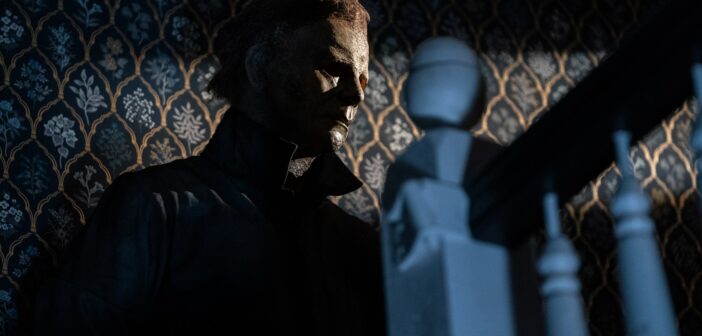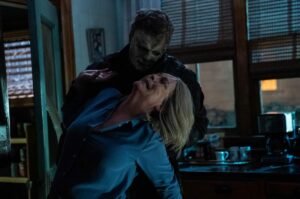Halloween Ends is an oddly shaped beast, at once vicious and despairing, yet disarmingly quiet and sombre.
If David Gordon Green’s Halloween Kills was a bold swing of a kitchen knife, seeking out sociopolitical depths, then the capper to his trilogy, Halloween Ends, is one massive stab in the dark. The first in the franchise since Rob Zombie’s Halloween II to propose any remote change to its formula, Ends is its own distinct and innovative beast. It refuses to easily satisfy the enacting of epic proportions sought after with trilogy endings, as lead to believe through its false marketing. It combines the conceits and total personal conviction of Kills, with a firm grasp of the franchise’s essence as the 2018 starter, and makes a film that can only be described as truly weird… and wonderful. What results is naturally flawed, yet the fact it’s not as neat and easy as what could have been is what makes it all the more admirable, if not better.
Abandoning traditional structures and expectations not just of the slasher genre, but the Halloween franchise by extension, Green’s mindset for Ends is towards something new; entrenching in newfound inspirations and life. It owns a downright wild range of diverse influences, such as Fallen Angels, Lost Highway to IT and John Carpenter’s Christine. So fully enveloped in its own offbeat headspace is the film that it often shifts around in a number of disparate modes like romance and drama that, by some miracle, weirdly meshes well together. The success of its idiosyncratic blend is likely down to the fact that it’s wholly driven by character and idea. For fans desiring the series’ usual or a fast-paced denouement, the unexpected leap to slow-burner from Kills’ relative chaos will likely preclude them from admiring the film. On the other hand, those willing to work with Ends offbeat rhythms are rewarded.
Halloween Ends re-focuses back to Laurie and the Strode family in general. It adds fascinating new elements to the dynamic however: the creation of a new character to also take centre stage, Corey Cunningham (compellingly played by Rohan Campbell), and, subsequently, a reduction to Michael’s screentime. It’s an admittedly risky move by Green and writers, Paul Brad Logan, Chris Berniers and Danny McBride, to introduce someone so late into the game, especially in the final outing of a trilogy which promises attention to Laurie and Michael. It sits on top of the fact Corey begins to work with Michael in a fascinating if confusingly rendered transference of evil. Yet, it works here: Cunningham is genuinely interesting and how he alters is engaging. His close interactions with Laurie and Allyson likewise opens them to become deeply involved in Corey’s transformation, with Laurie’s barely-concealed continued obsession over Michael. It gets back to the heart of Laurie’s internal and external struggles with trauma, both old and new and gives the feature heaps of emotionality, helping to finally deliver on the final inevitable showdown with her bogeyman. It allows Ends to properly explore and cap off its themes.
If there’s, at least, one thematic through-line of Green’s fairly messy trilogy, it’s the examination of evil itself. Ends speaks through its characters’ actions and its effectively gloomy atmosphere on the transcendence of evil beyond Michael; its parasitic spread to the fringes, a force so enormous the bogeyman can no longer fully contain. Despite not appearing until 40 minutes into the film, Michael’s presence is felt in every moment and character in a genuine successful retry of the thematic conceit behind Halloween Kills‘ mob subplot. They are haunted by him when he himself has been weakened following his near-defeat at the end of Kills. Carpenter’s fantastic score rocks through the film with a definitive feeling of operatic inevitability and finality. No longer do people have any place to annually syphon their feelings of fury and hatred into an old folk tale or bogeyman. Evil has, and will, spread on.
Thus stems Halloween Ends biggest surprise in that it maintains an authenticity to the original film in a way no other films in the franchise, even its best sequels and re-imaginings, can really be said to quite closely recapture. Whilst the interest in metaphor and symbolism has proved disastrous in Green’s other Halloween films, what can not be faulted is their principal understanding from Carpenter’s classic that Michael Myers is not the be-all end-all as an idea of evil. Halloween fans’ perceive Michael too literal, ignoring the fact ‘The Shape’ is not a singular entity but, in fact, a microcosm for evil. Rather, it was that he existed at all that left Carpenter’s original film so encompassing and terrifying, with everything that it implied; the haunting shot of his final vanishing imprinted forever on the soul of the viewer. Ends concludes on much the same point.
Despite these ambitions largely paying dividends in rather important ways, it also does strain Halloween Ends. While less action is a welcome tradeoff for greater narrative material, what remains of it is an afterthought. As for Green’s directing ability here, though not as glossy and dull as the majority of Kills‘ visuals, and some fantastic images are scattered throughout, the digital photography remains unsightly. It also, as with all his installments, refuses to improve upon its cuts-heavy editing style and deficiency in moving between scenes. For some reason, possibly betrayed by his flatly-shot comedy background, Green continues to be sloppy at technicalities with the potential exception of his 2018 film, though these issues crop up there too.
Even as it commits to these singular approaches far more convincingly than Kills, with a much leaner structure in tow, Halloween Ends, nonetheless, descends into moments of absurdity that never operate with the rest of the feature. It borders on near collapse from a tonal viewpoint much the same as its predecessor, before being saved by the goodwill of the fascinatingly earnest storytelling and dedication to character. That Ends retroactively manages to improve on its older sibling, making it seem less unfocussed, is an impressive positive unto itself. Jamie Lee Curtis puts in a great final performance as Laurie here, unequivocally earning her victory in a fittingly non-explosive but rather sincere manner, with hopes of a brighter future. Time will only be kinder and kinder to Halloween Ends. It is an oddly shaped beast, at once vicious and despairing, yet disarmingly quiet and sombre. A beautifully strange coda to a beautifully strange saga, to be sure.





